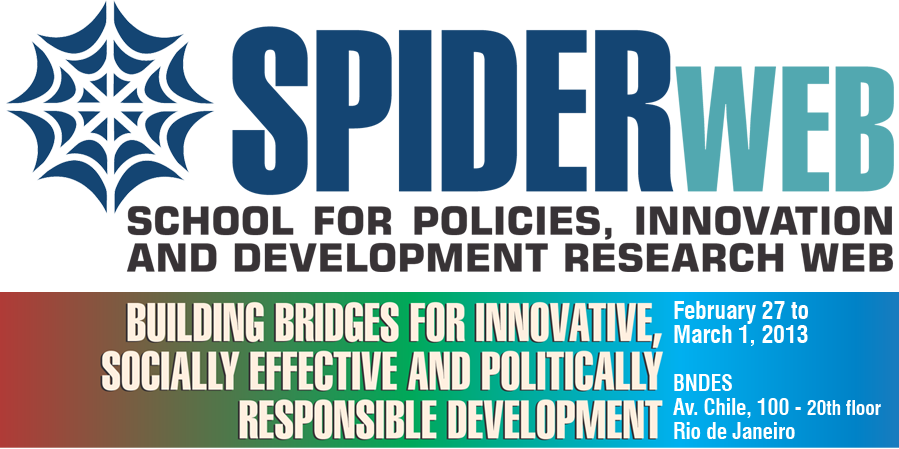Day 1 – February 27
Registration: BNDES entrance 9h00 – 9h30
9h30 – 9h45 – Welcome and Introduction:
Luiz Eduardo Melin de Carvalho e Silva (BNDES Director) *
Ana Célia Castro (PPED, INCT-PPED, Brazil), *
Renato Boschi (IESP, INCT-PPED, Brazil) *
9h45 – 13h150 – Session 1
Global Challenges, Restrictions and Policy Space: Finance and Development
New historical circumstances, such as globalization, the resurgence of the role of the state, and the recent economic crisis, have created unique opportunities to reopen the debate on diverse development models vis-à-vis the inexorable process of globalization. Macro-finance and financing development in a new era are the main issues that deserve renewed economic thinking.
Chair: Fernando Cardim de Carvalho (Professor, UFRJ, Brazil) *
9h45 – 10h35 – Introducing themes and proposals for the debate
Jan Kregel (Levy Institute, USA, and MINDS) *
Roberto Frenkel (CEDES, Argentina) *10h35 – 11h25 – Comments
Luiz Carlos Bresser Pereira (FGV-SP, Brazil) *
Gary Dimsky (Leeds University, UK) *
Rogerio Studart (World Bank, USA) *11h25 – 11h40 – Coffee-break
11h40 – 13h15 – Round Table
Chair: Carlos Frederico Leão da Rocha (IE, UFRJ, Brazil)*
Participants:
Albert Keidel *
André Modenesi *
Andrew Fisher *
Antonio Carlos Macedo e Silva *
Carlos Eduardo Young*
Carmem Feijó *
Daniela Prates *
Ernani Teixeira *
Fabio Freitas *
Fernando Nogueira da Costa *
Fernando Puga *
Francisco Eduardo Pires de Souza *
José Luis Oreiro *
Lavinia Barros de Castro*
Leonardo Burlamaqui*
Luiz Fernando de Paula *
Margarida Gutierrez *
Manuel Montes *
Mario Possas *
Maryse Farhi *
Robert Wade *
Rogério Sobreira *
13h15 – 14h45 Lunch
14h50 – 19h00 – Session 2
Governance Challenges, Institutional Building, and National Responses
Different institutional matrices configure varieties of capitalism differently, where state coordination role appears with more or less centrality in the establishment of new patterns of development. The importance of evaluating how state elites design strategies for their countries in the medium-term, in their own institutional settings, based on what policy instruments they have at their disposal, calls for a comparative approach analysis. The dynamics of market expansion, the implementation of proactive policies and the creation of coalitions at the domestic level are central to the success of the above-mentioned strategies. Coalitions in international arenas should also be considered, because of their impact in the new competitive scenario.
Chair: Fabiano dos Santos (IESP, Brazil) *
14h50 – 15h40 – Introducing themes and proposals for debate
Emily Jones (Oxford University, UK) *
Renato Boschi (IESP, INCT-PPED, Brazil) *15h40 – 16h25 – Comments:
Robert Wade (London School of Economics, UK) *
Sebastian Płóciennik (Universytet Wrockawski, Poland) *
Rainer Kattel (University of Tallin, Estonia) *16h25 – 16h40 – Coffee-break
16h40 – 19h00 – Round Table
Chair: Celina Souza (IESP, INCT-PPED)*
Alexandre D´Avignon
Alexandre Gomide *
Allan Rocha *
Ana Urraca Ruiz*
Andreas Nölke *
Andrew Fischer *
André Carvalhal *
Carlos Morel*
Célia Kerstenetzky*
Charles Pessanha *
Cláudia Chamas *
Cristiano Monteiro *
Eduardo Diniz *
Eduardo Gomes *
Eduardo Kaplan Barbosa *
Estela Neves *
José Miguel Busquets *
Fátima Anastasia *
Flávio Gaitán *
Ignácio Godinho *
Inês Patrício *
Jaques Kerstenetzky *
Liliana Acero*
Maria Antonieta Leopoldi *
Maria Tereza Leopardi *
Marta Irving *
Mônica Desiderio *
Prabhat Patnaik *
Regina Bruno *
Ronaldo Fiani *
Silvana de Paula *
(* Confirmed)






